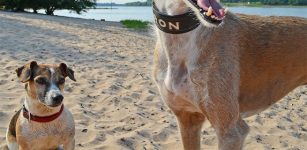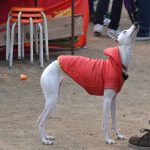What does the Companion Animals Act say about Dogs in Public Places?

As a dog owner, you have certain responsibilities when your animal is in public.
If your dog is classified as a dangerous dog these responsibilities increase, but even owners of non-dangerous dogs have a number of different rules they need to abide by if they want to avoid a fine or criminal proceedings.
The law surrounding the ownership of dogs and other animals is set out in the Companion Animals Act of NSW.
This act specifies how and when a dog should be controlled if they are in a public place, including a public dining area, and what the penalties are for failing to abide by the rules.
Where are dogs prohibited?
There are certain public areas where dogs are not permitted to go, and as an owner it is your responsibility to ensure that your dog doesn’t venture into these areas. Prohibited areas for dogs include:
- Within 10 metres of children’s play areas.
- Food preparation and consumption areas.
- School grounds and childcare centres.
- Public bathing areas.
- Shopping areas.
- Wildlife protection areas.
Under the Companion Animals Act, If your dog is found in a prohibited place you could face a fine of up to $330, regardless of whether it is on a leash or not.
What about other public places?
Dogs in any other public places are required to be on a lead at all times.
There are a few exceptions to this rule, including dogs in approved off-leash areas, dogs that are restrained in a vehicle or cage, and dogs that are taking part in shows, exhibitions or agility and obedience trials.
The lead must be in the control of a competent person, and no one person should have more than four dogs under their control at any one time.
The penalty for having a dog off the lead in a public place is a $220 fine.
Even if your dog is in an off-leash area and being exercised, it still needs to be under the control of a competent person. The same rule of no more than four dogs per person applies in off-leash areas.
What if I have a restricted dog?
If you own a dog that is a restricted breed or one that has been declared dangerous due to exhibiting aggressive behaviour or attacking another animal or person, you will have additional responsibilities when your animal is out in public.
Restricted dogs are required to wear a distinctive collar and to be muzzled whenever they are in public.
A restricted dog must be on a leash and muzzled at all times and the leash must be under the control of a competent person.
A restricted dog is also not allowed to be in the sole charge of someone who is under the age of 18 at any time.
Failing to comply with the control requirements for a restricted dog can lead to heavy fines of up to $16,500.
If your dog attacks or chases another animal or a person in a public place you could end up liable for criminal charges.
If you are facing penalties for not having sufficient control of your dog in a public place, speaking to a lawyer who is experienced in Companion Animals Act cases may be helpful.






